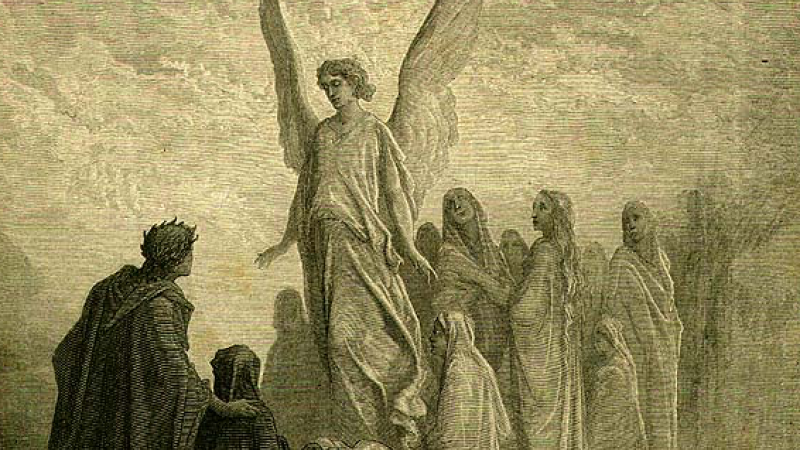Tour of Omnibus Series: Epic Poetry and the Divine Comedy

Recently, I have been on a number of tours. My third daughter, Karis, has been looking at colleges and I have had the pleasure of accompanying her on this adventure. Tours are fun because you get to see new things and you have an opportunity to decide what is valuable and why you value things. So, I decided to take you on a tour of Omnibus. On this tour, we are going to look at the different sorts of books that we read in Omnibus and I am going to make a case for why it is good for us to read this sort of book. Today, we are going to start with Epic Poetry.
In the West, Epic Poems have had a power that few types of literature possess. For the Greeks and the Romans these poems, especially those of Homer and Virgil, have an almost religious significance. Interestingly, when Christianity overcame paganism in the West, believers did not throw away the great works of the past. Instead, they studied them, learned them, and eventually added Christian epic poems. These epics like Dante’s Divine Comedy and Milton’s Paradise Lost are some of the most powerful Christian works of literature.
So, why do we read epic poems? We read epic poetry because it taps into something deep in us, it stretches our abilities and shapes the way we look at the world, ourselves, and our future.
- The Depth of Epic Poetry
Many modern stories, the best ones, attempt to tap into stories that are embedded deep within the world God made. I still remember the first time I read through or watched the end of the Harry Potter series. I was stunned by the overt borrowing for Christianity and from the epics.
This depth is one of those things that is a bit mysterious. Remember, Homer was a blind poet. He wrote a poem that is 18 hours long if you recite it. People memorized the entire poem and recited portions of it for thousands of years. The poets believed that they were being carried along by spirits, the Muses, when they wrote and recited epic poetry and one does have to admit that memorizing an 18-hour poem is pretty amazing.
Greek and Roman poetry defined virtue and heroism in their culture. Achilles learns hopelessness and perhaps a bit of empathy by the end of the Iliad. Odysseus makes his way home to save his wife and son. Aeneas overcomes the loss of his city to become the man who founded the Roman Empire. These great heroes were what young people aspired to be in those cultures. The stories and their themes tap into that deep longing for meaning that eventually can not be sustained in the pagan world.
Christian epics take things a step further but continue to tap into those deep storylines. Dante, like the heroes before him, travels to the underworld so that he can see the world of the living as God sees it. Dante heroism, however, displays an even deeper need that is woven into the fabric of our souls. He brings us on a journey toward God, meaning, and forgiveness. The tragedy of Achilles is replaced by the Comedy of Dante.
- Epic poems stretch us
Reading epic poetry is not easy. Wes Callihan once told me that a new reading of The Divine Comedy will get nothing out of it the first time they read it. I think that this might be true if you read it without a teacher. I know that my first read of Dante was challenging. Many times I spent more time reading the notes than the text. Why read them then? We do it because these works aren’t supposed to be read once. They are supposed to be books that we come back to over and over. They get sweeter each time we read them. This has certainly been my experience with Dante.
The first time I read about the earthly Paradise in Dante’s Purgatory. I had no idea what was happening. It seems like idolatry or just plain weirdness. I now believe that it is one of the most beautiful passages in all of literature. It speaks to what we all long for: peace with God and to return to His presence. We all long to be back in the Garden. I think about that passage often when we celebrate the Lord’s Supper because that is another time when we can come to God and know peace.
Very few books are as demanding as epic poetry, but we make it a part of Omnibus because readers of epic poetry are stretched and grown by reading these great books.
- Reading Epic Poetry shapes the way we look at the world, ourselves, and our future.
When you read the epics, you see the world differently. They help you understand and empathize with heroes of the past. They call you to be or to think like those heroes.

Again, Dante’s Comedy is the best example of this. During his visit to Hell, he shows us all different sorts of sins. The just punishment of those sins is experiencing the sin without the illusion. The lustful turn people into things and are blown about by the tempest of their feelings; the gluttons lose their ability to discern between good and evil things or food; the spendthrifts and the hoarders lose their identity as they chase things. When I am tempted Dante helps me know and feel the temptation. He also shows me what I am really embracing when I get angry or when I want to have something that I should not. He also helps me see what is happening in the world around me when others are pulled into a particular sin. I am blessed by his helping me see things that I would have never seen if I had not read the Comedy.
So, epic poetry reverberates with something deep inside us, it stretches our abilities, and it helps us see the world differently. That’s why we read epic poems and that's why we hope that our students continue to read them as they grow into adulthood.







